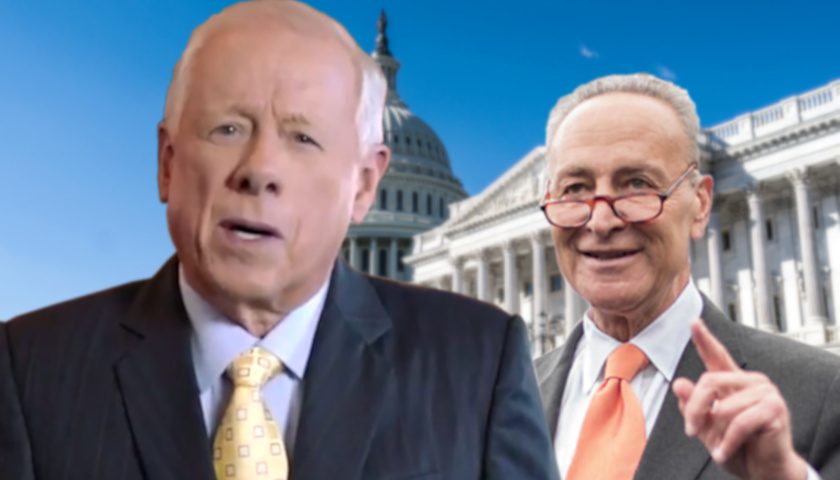During the six years he has served as the head of Tennessee’s state government, Gov. Haslam has cut the state’s portion of the Highway Fund budget by an annual average of $56 million when compared to his predecessor, Gov. Phil Bredesen.
In the last six years of Gov. Phil Bredesen’s eight-year term, between FY 2005-06 and FY 2010-11, the annual average state allocation to the Highway Fund was $833 million. While the actual dollars fluctuated from year to year, overall the Highway Fund budget grew about 12 percent in those six years.
Under Gov. Haslam, the state’s portion of the Highway Fund budget shrank to an annual average of $777 million during the six years between FY 2011-12 and FY 2016-17. That is an average annual reduction of $56 million, an overall reduction of 7 percent.
The total Highway Fund grew 2 percent per year under Gov. Bredesen, and has been reduced 1.1 percent per year by Gov. Haslam. In that same six-year period, Gov. Haslam’s total state budget grew 18 percent.
“The detailed breakdown of reduction in road spending under Governor Haslam is shocking but, unfortunately, not surprising,” State Sen. Mae Beavers (R-Mt. Juliet) tells The Tennessee Star.
“I will be requesting that Transportation Committee Chair Paul Bailey immediately have the Tennessee Transportation Commissioner explain the reasons for diverting our road funds, the status of repayment of funds ‘borrowed’ under the Bredesen administration,” Beavers adds.
“These numbers reflect that we have an integrity crisis rather than a road crisis in Tennessee,” State Rep. Terri Lynn Weaver (R-Lancaster), Chairmain of the Transporation Subcommitee, tells The Star.
“I want the Transportation Commissioner to explain to my committee why he thinks we should spend more money on road construction, but we’re not already spending what we have for road construction,” Weaver adds.
Gov. Haslam has also allocated less of the gasoline tax and motor vehicle registration and title “user fees” to transportation over the course of his term as compared to his predecessor.
In the final six years of his term, Gov. Bredesen allocated a low of 60 percent in 2009-10 when the state budget decreased by $1.2 billion from the previous year due to the financial crisis. The other years, he allocated 70 percent two years, 78 percent two years, and in his last year 89% of the “user fees” were allocated to transportation by Gov. Bredesen.
By contrast, Gov. Haslam’s budgets allocated gasoline tax and motor vehicle “user fees” 78% his first year, 75% two years and 63% the most recent two years and again for the upcoming budget year.
While Gov. Bredesen steadily increased the percentage of “user fees” to transportation, Gov. Haslam steadily decreased “user fee” allocations to transportation.
Since Gov. Haslam’s first budget in 2011, gas tax revenues have grown 5 percent, from $938 million to $983 million. The other “user fee” revenue source, motor vehicle registrations, has grown 18 percent from $268 million to $328 million. These two revenue sources combined have grown and increased the potential funding for roads by $104 million or 8 percent.
Table 1 below shows, by year, with links to the source documents, that the annual average state allocation to the Highway Fund was $833 million during the last six years of the Bredesen administration.
| Table 1 | ||||||
| Highway Funding Under Last 6 Years of Bredesen Administration | ||||||
| FY 2005-06 to FY 2010-2011 | ||||||
| (in $) | ||||||
| Fiscal Year | 2005-06 | 2006-07 | 2007-08 | 2008-09 | 2009-10 | 2010-11 |
| Governor | Bredesen | Bredesen | Bredesen | Bredesen | Bredesen | Bredesen * |
| Data Source (With link to document) | Actual | Actual | Actual | Estimated | Actual | Actual |
| Page of Data Source | 89 of 613 | 51 of 609 | 47 of 626 | 58 of 674 | 54 of 667 | 58 of 668 |
| Tennessee Highway Expenditures | ||||||
| State of Tennessee | 787,609,500 | 814,102,500 | 833,569,300 | 804,500,000 | 871,073,600 | 889,674,900 |
| 6-Year Average FY 2005-06 to FY 2010-11 | 833,421,633 | |||||
| * Gov. Haslam took office in January 2011. The FY 2010 -2011 budget was prepared by Gov. Bredesen and covered the period ending June 30, 2011. | ||||||
| Data Sources: | ||||||
| FY 2005-06 | page 89 | |||||
| FY 2006-07 | page 51 | |||||
| FY 2007-08 | page 47 | |||||
| FY 2008-09 | page 58 | |||||
| FY 2009-10 | page 54 | |||||
| FY 2010-11 | page 58 | |||||
Table 2 below shows, by year, with links to the source documents, that the annual average state allocation to the Highway Fund was $777 million during the last first six years of the Haslam administration.
| Table 2 | ||||||
| Highway Funding Under First 6 Years of Haslam Administration | ||||||
| FY 2011-12 to FY 2016-17 | ||||||
| (in $) | ||||||
| Fiscal Year | 2011-12 | 2012-13 | 2013-14 | 2014-15 | 2015-16 | 2016-17 |
| Governor | Haslam | Haslam | Haslam | Haslam | Haslam | Haslam |
| Data Source (With link to document) | Actual | Actual | Actual | Actual | Actual | Estimated |
| Page of Data Source | 54 of 656 | 54 of 545 | 54 of 542 | 54 of 550 | 54 of 558 | 54 of 558 |
| Tennessee Highway Expenditures | ||||||
| State of Tennessee | 866,886,300 | 823,104,600 | 683,800,400 | 792,219,800 | 740,645,600 | 756,856,000 |
| 6-Year Average FY 2011-12 to FY 2016-17 | 777,252,117 | |||||
| Data Sources | ||||||
| FY 2011-12 | page 54 | |||||
| FY 2012-13 | page 54 | |||||
| FY 2013-14 | page 54 | |||||
| FY 2014-15 | page 54 | |||||
| FY 2015-16 | page 54 | |||||
| FY 2016-17 | page 54 | |||||
In January 2015, the Tennessee Comptroller of the Treasury Offices of Research and Education Accountability issued a 76-page report, “Tennessee Transportation Funding: Challenges and Options.” The report cites several factors for the reduction in fuel consumption and fuel tax revenues including increased fuel efficiency of vehicles, reduced growth in vehicle miles traveled, alternative fuel vehicles, and fixed rate fuel taxes among others. The report offers at least eight possible funding options for roads and reviews the funding situations in the eight states surrounding Tennessee.
The Principal Legislative Research Analyst named on the report, Susan Mattson, appeared before the House Transportation Committee on February 14, as part of the panel presenting “Transportation Needs for the Next Tennessee.”
In Ms. Mattson’s presentation to the committee, the first three “Possible Revenue Options” were to increase fuel tax rates, index fuel tax rates to inflation or price of fuel, and increase motor vehicle registration fees including adding a use tax for alternative fuel or high-mileage vehicles that pay little or no fuel taxes. All three of these options are, coincidentally, included in Gov. Haslam’s IMPROVE Act. Six options used by other states were also presented.
Ms. Mattson’s report and presentation to the committee both include pie charts describing the sources of revenue to the state’s Highway Fund and showed decreases in revenue.
In the presentation, Ms. Mattson stated, “Tennessee relies more heavily on highway user taxes than other states.” She also stated, “Transportation revenues in Tennessee are not expected to be sufficient to maintain existing highways and meet long-term transportation demand. User fee revenues have stagnated and are not expected to increase without changes.”
Nowhere in the comptroller’s office report the presentation was there mention that allocations to the Highway Fund had been reduced, or that a lesser portion of the fuel tax and other motor vehicle “user fees” had been allocated to the Highway Fund or that revenues from gasoline tax and motor vehicles had increased.
In a November 2016 document, “A Guide to the Office of the Comptroller of the Treasury State of Tennessee,” Comptroller Justin P. Wilson states, “State law prescribes the Comptroller’s duties, which include the audit of state and local governmental entities and participation in the general financial and administrative management and oversight of state government.”
“We must be honest in all we do and say in order to reflect the highest degree of integrity,” the guide states.
“Decision makers and their publics must be able to depend on our work.” And their “purpose is to serve the people of Tennessee by contributing to the protection of the public trust and promoting the public interest,” the guide continues
The Comptroller of the Treasury reports to the Tennessee General Assembly, not the governor.
As such, the Tennessee General Assembly can call for the Comptroller to conduct an investigation into the premises behind Gov. Haslam’s IMPROVE Act that proposes to increase the gas tax prior to any vote on the proposal.









[…] The Tennessee Star, Governor Haslam cut the state’s portion of the Highway Fund by an average of $56 million per year as compared to Governor […]